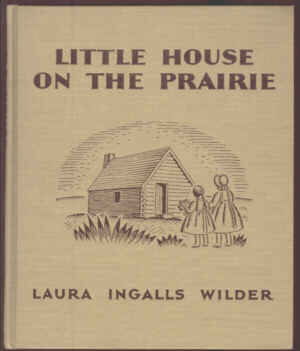The far right has adopted the beloved children's books as an instrument for teaching the virtues of "lived liberty"
By Caroline Fraser
Beloved though they may be, however, the books are in danger of being politicized, having already acquired a certain conservative aura. Much of it emanated from the 1970s-era television caricature, “Little House on the Prairie,” which leached the books of their rich specificity while displaying an often shirtless Michael Landon, chest shaved, addressing concerns never mentioned in the originals, including drug addiction, rape, and menopause. Ronald Reagan reportedly called it his favorite television show (Landon campaigned for him), watching it in the White House while he and his wife dined off TV trays. In a 2008 profile of the Republican vice-presidential nominee, the New York Times cited one of Sarah Palin’s sisters remembering that her sibling read “a lot” as a child. The only specific title she could recall was Little House on the Prairie.
The impression has lately been reinforced by the books’ adoption into Tea Party circles as ideal teachers of “lived liberty.” That’s a phrase that occurs in “Lessons in Liberty from Laura Ingalls Wilder,” an essay in the summer issue of National Affairs, the reboot of Irving Kristol’s quarterly The Public Interest. Dedicated to helping Americans “rise a little more ably to the challenge of self-government,” National Affairs features the work of Charles Murray, George Will, and David Brooks, who hailed it as “the bloody crossroads where social science and public policy meet matters of morality, culture and virtue.”
Wilder is now detained at those crossroads by Meghan Clyne, managing editor of National Affairs, former speechwriter for Laura and George W. Bush and contributor to the New York Post (where she worried that an Obama nominee might introduce sharia law). Clyne calls for building an “historical-appreciation movement” around Wilder, who is to model self-reliance for millions of less worthy Americans currently receiving Medicare, Medicaid, Social Security, and “food stamps or other nutrition benefits.” Citing Jefferson, Clyne warns against “degeneracy” in the dependent, commending Frederick Jackson Turner’s 1893 paper for its depiction of “the conquest of this last unsettled frontier,” without remarking on the removal of natives that made it possible, paid for by the federal government and intended as the type of benefit she condemns. She takes no notice of the fact that Indians occupy a great deal of real estate in Little House on the Prairie, with its references to the 1862 “Minnesota massacre,” when Sioux warriors angered by treaty violations killed hundreds of soldiers and settlers and were then captured, tried, and hung in the largest mass execution in our history. Or that the little house in question was built illegally on an Osage reserve, which may explain why the Ingallses relinquished it.
Condemning “welfare-state redistribution,” Clyne embraces the 1862 Homestead Act, central to the later Little House books. Yet it was one of the biggest federal handouts in American history. Clyne praises it as policy that “encouraged habits of self-reliance rather than undermining them,” but it sought to give away a trillion acres of “free land,” as it was called, in 160-acre parcels to those over twenty-one if they could live on it and improve it over five years. Homesteading was no picnic, as Wilder makes clear, but everyone at the time knew it was a giveaway. Wilder remembers her father singing, “Uncle Sam is rich enough / To give us all a farm!” a popular ditty that hardly comports with Clyne’s contempt for “the crutch of government support.” The Homestead Act was not a particularly successful incubator of self-reliance, as only a fifth of the land went to small farmers, and less than half of all homesteaders managed to make the necessary improvements to keep it. The Act was also undermined by fraud and land speculation: Much of the property was acquired by railroads and large ranching interests.
In short, refashion America as a great white bastion of Euro-Christian triumphalism. Shout "USA is no. 1!" for people with fragile egos who can't handle the complex truth. Hold the hands of weak-kneed Americans so they won't bawl like babies.
For more on this conservative rewriting of history, see GOP America = Strivers vs. Parasites and America's "Bootstrap Theocracy." For more on Little House on the Prairie, see Wilder the Typical Conservative and Little House on the Reservation.


1 comment:
Weren't they government-subsidized, though? Obviously if you consider that the U.S. government went to war with the Sioux (one time) because the Sioux euthanized a runaway cow owned by a Mormon (and then ate it), that is government subsidy.
Post a Comment